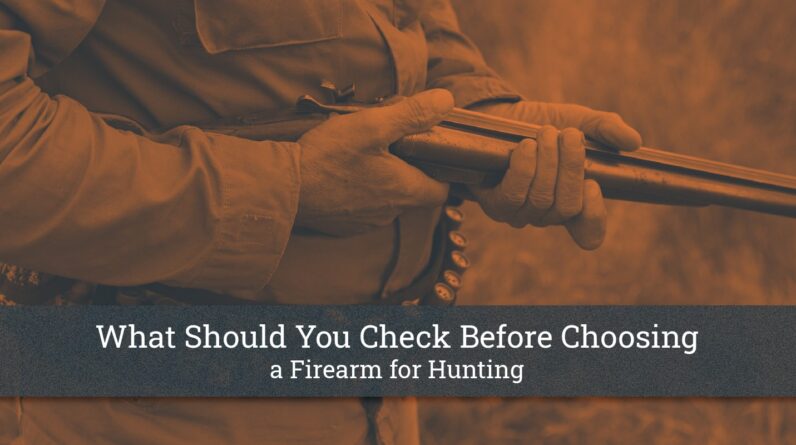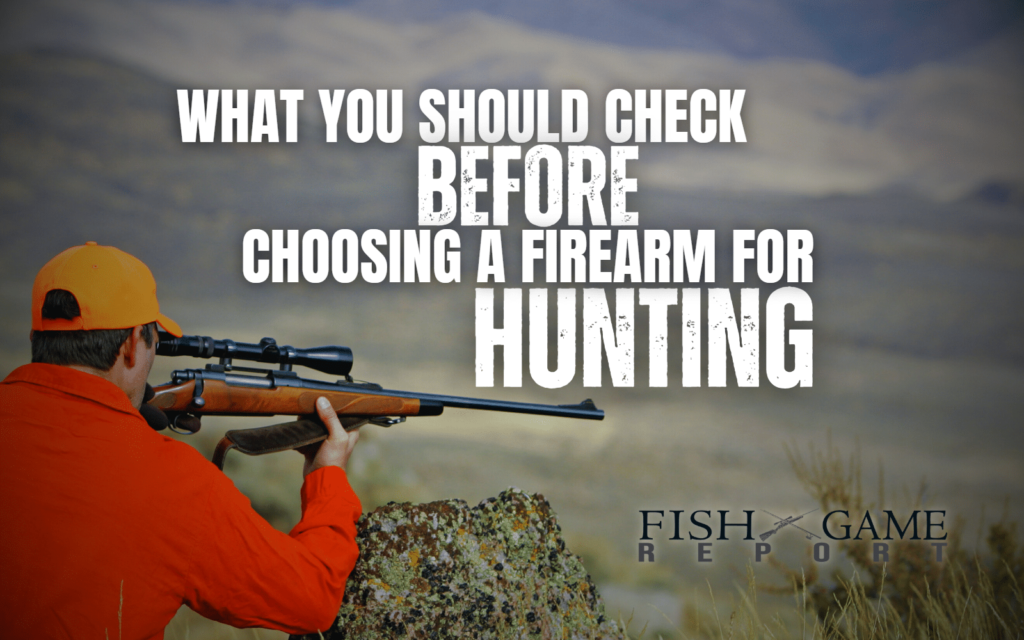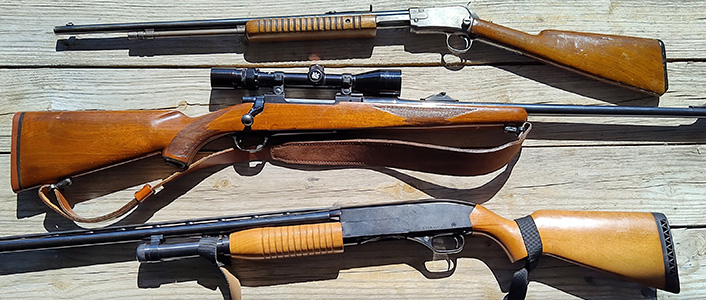
Have you ever wondered what you should check before choosing a firearm for hunting? Well, you’re in the right place! Hunting is an exciting and challenging activity that requires careful consideration when it comes to selecting the right firearm. In this article, we will discuss the essential factors you should keep in mind to ensure a successful and safe hunting experience. So, let’s dive in and find out what you need to know before making that important decision.
First and foremost, it’s crucial to determine the type of game you plan on hunting. Different firearms are suitable for different types of game, so it’s essential to match your choice of firearm to your hunting purposes. For example, if you’re planning to hunt small game like rabbits or squirrels, a lightweight .22 caliber rifle would be more appropriate. On the other hand, if your target is larger game such as deer or elk, a more powerful rifle with a larger caliber like a .30-06 or .308 Winchester may be necessary. By considering the game you’ll be hunting, you can narrow down your options and choose a firearm that will be both effective and efficient for your specific needs.
In addition to considering the type of game, you’ll also need to think about the environment in which you’ll be hunting. Factors such as the terrain, distance of the shots you expect to take, and the climate can all impact the performance of your firearm. For example, if you’ll be hunting in dense forest areas where visibility is limited, a shotgun or a rifle with a shorter barrel might be more suitable. Similarly, if you’ll be shooting at long distances in open fields, a rifle with a longer barrel and higher caliber may be preferable. Additionally, considering the climate is crucial to ensure that your firearm is properly protected from moisture and extreme temperatures. By taking into account these environmental factors, you can select a firearm that will perform optimally in the hunting conditions you anticipate.
In conclusion, choosing the right firearm for hunting involves careful consideration of various factors. By determining the type of game you plan on hunting and considering the environment in which you’ll be hunting, you can make an informed decision that will enhance your hunting experience. In the upcoming article, we will explore these factors in more detail and provide you with practical tips for selecting the perfect firearm for your next hunting expedition. So, stay tuned and get ready to become a more effective and responsible hunter!

CLICK HERE FOR THE BESTSELLING HUNTING GEAR
Firearm Type
Hunting can be an exhilarating and fulfilling outdoor activity. Whether you are a seasoned hunter or a beginner, choosing the right firearm is crucial for a successful and safe hunting experience. With so many options available, it can be overwhelming to choose the best firearm for your needs. In this article, we will guide you through the factors you should consider before making a decision. By considering these factors carefully, you can ensure that you select a firearm that is suitable for hunting and meets your specific requirements.
Consider the Purpose of Hunting
Before purchasing a firearm for hunting, it is essential to consider the purpose of your hunting activities. Are you planning to hunt small game like birds or rabbits, or are you aiming for larger targets such as deer or elk? The type of game you plan to hunt will greatly influence the type of firearm you need. For example, for smaller game, a shotgun may be more suitable, while for bigger game, a rifle might be a better choice. Understanding your hunting goals will help you make an informed decision when it comes to selecting the right firearm.
Understand Different Types of Firearms
Once you have determined the purpose of your hunting, it is important to familiarize yourself with the different types of firearms available. The most common types of firearms used for hunting include shotguns, rifles, and handguns. Shotguns are often used for hunting birds and small game, as they disperse a cluster of small pellets, providing a wider range. On the other hand, rifles are designed for accuracy and are suitable for long-range shooting. Handguns are generally used for hunting in close quarters or as a backup weapon. Understanding the features and capabilities of each firearm type will help you choose the most appropriate one for your hunting needs.
Caliber and Ammunition
Determine the Suitable Caliber for your Hunting Needs
Caliber refers to the diameter of the bullet or the internal diameter of the firearm’s barrel. Choosing the right caliber is essential for accuracy and effectiveness in hunting. The caliber you choose should align with the game you plan to hunt. For example, smaller game, such as rabbits, can be hunted with a .22 caliber rifle, while larger game, such as deer, may require a .30-06 caliber rifle. It is important to research and understand the recommended calibers for the specific game you intend to hunt. This will ensure that your firearm has enough power to ethically and effectively take down the target.
Consider Ammunition Availability and Cost
In addition to caliber, it is also important to consider the availability and cost of ammunition for your chosen firearm. Some calibers may be more readily available and affordable than others. Before making your final decision, research the availability and cost of ammunition for the caliber you intend to use. It is also worth considering the specific type of ammunition that is recommended for the game you plan to hunt. Different types of ammunition, such as hollow point or soft point, may perform differently and have varying effects on the target. Taking these factors into account will help you budget for ammunition and ensure that you can always find the necessary rounds for your firearm.
CLICK HERE FOR THE BESTSELLING HUNTING GEAR
Accuracy and Range
Evaluate the Firearm’s Accuracy Performance
Accuracy is a crucial factor when it comes to selecting a firearm for hunting. A firearm with good accuracy will greatly enhance your chances of hitting the target with precision. Before purchasing a firearm, research its accuracy performance. Look for reviews and user experiences to get an idea of how well the firearm performs in terms of accuracy. It is also advisable to test-fire the firearm if possible to assess its accuracy firsthand. Remember, a highly accurate firearm can be the difference between a successful hunt and a missed opportunity.
Assess the Effective Range for Hunting
Another important consideration is the effective range of the firearm. The effective range refers to the maximum distance at which the firearm can consistently hit the target with sufficient power. Understanding the effective range of a firearm is particularly important if you plan to hunt in open areas where long shots may be required. Take into account the terrain and the typical shooting distances you may encounter while hunting. Choosing a firearm with an effective range that aligns with your hunting environment will increase your chances of a successful hunt.
Weight and Maneuverability
Consider the Firearm’s Weight and Handling
The weight of a firearm can greatly impact your hunting experience, especially if you plan on carrying it for extended periods of time. A heavy firearm can become tiring to carry and may affect your accuracy and maneuverability. Consider your physical strength and stamina when choosing a firearm. If you anticipate hiking long distances or hunting in challenging terrains, it may be wise to opt for a lighter firearm. Additionally, take into account your shooting style and preferences. Some hunters may prefer a heavier firearm for its stability, while others may prioritize a lightweight and easy-to-handle option.
Evaluate Maneuverability in Hunting Environments
In addition to weight, the overall size and maneuverability of a firearm are important factors to consider. A long and bulky firearm may be difficult to maneuver in dense forests or tight spaces. On the other hand, a compact and shorter firearm may be easier to handle in such environments. Think about the type of hunting environment you anticipate and choose a firearm that is well-suited for that specific landscape. Being able to handle and maneuver your firearm comfortably will make your hunting experience more enjoyable and efficient.

Recoil and Control
Assess Recoil and Manageability
Recoil is the backward movement of a firearm caused by the force of discharging a round. It is important to assess the recoil of a firearm, as excessive recoil can negatively impact your accuracy and control. A firearm with excessive recoil may also cause discomfort and affect your shooting experience. Consider your physical strength, experience with firearms, and comfort level with recoil when selecting a firearm. It is recommended to test-fire the firearm before purchasing to get an idea of its recoil and manageability. Finding the right balance between power and manageable recoil will greatly enhance your shooting abilities and overall hunting experience.
Consider Control and Follow-up Shots
In addition to recoil, it is important to consider the control and follow-up shot capabilities of a firearm. After taking the initial shot, you may need to quickly and accurately take follow-up shots if the target is still moving or if there are multiple game animals. A firearm that allows for quick and controlled follow-up shots can greatly increase your chances of success. Consider features such as a low bore axis, adjustable sights, or a short reset trigger that enhance control and speed. Evaluating a firearm’s control and follow-up shot capabilities will ensure that you are prepared for different hunting scenarios.
Safety Features
Check for Safety Mechanisms and Features
Safety should be a top priority when selecting a firearm. Before making a purchase, carefully evaluate the safety mechanisms and features of the firearm. Look for features such as manual safeties, firing pin blocks, or trigger safety mechanisms. These features help prevent accidental discharges and ensure safe handling of the firearm. Additionally, consider the ease of operation of the safety mechanisms. A firearm with easily accessible and intuitive safety features will enhance your ability to keep the firearm in a safe condition during hunting activities.
Consider Firearm Safety Training
While safety features are important, they should not be relied upon solely. It is essential to have proper firearm safety training and knowledge before engaging in hunting activities. Familiarize yourself with the safe handling, operation, and storage of firearms. Taking a certified firearm safety course can provide you with valuable knowledge and skills to handle firearms responsibly. Remember, safety is not only about protecting yourself but also about ensuring the well-being of those around you. Make safety a priority when choosing a firearm and commit to ongoing training and adherence to safe handling practices.

Durability and Maintenance
Assess the Firearm’s Durability and Resistance to Weather
Durability is a key consideration when selecting a firearm for hunting. Hunting often takes place in various weather conditions, including rain, snow, or extreme temperatures. A firearm that is built to withstand these elements is essential for reliable performance. Pay attention to the materials used in the construction of the firearm and its resistance to corrosion and rust. Additionally, consider the overall build quality and reputation of the manufacturer. A well-built and durable firearm will ensure that it can withstand the rigors of hunting and serve you reliably for years to come.
Consider Maintenance Needs and Costs
Regular maintenance is crucial to keep a firearm in optimal working condition. Before making your selection, research the maintenance needs and costs associated with the firearm you are considering. Some firearms may require more frequent cleaning and maintenance than others. Assess the ease of disassembly, cleaning, and reassembly of the firearm. Additionally, consider the availability and cost of replacement parts, should they be needed. Choosing a firearm with manageable maintenance needs will help you keep it in top shape and ensure its longevity.
Sights and Optics
Evaluate Sights and Optics for Accuracy and Hunting Conditions
The sights and optics of a firearm play a vital role in accuracy and target acquisition. Different types of sights, such as iron sights, red dot sights, or scopes, offer varying levels of precision and versatility. Consider the type of hunting you plan to engage in and choose sights and optics that are suitable for your specific needs. For example, if you anticipate hunting in low-light conditions, a scope with high light transmission capabilities may be beneficial. Before making a decision, research the different options available and consult with experienced hunters who can provide guidance based on their field experience.
Consider the Need for Additional Accessories
Accessories can further enhance the functionality and versatility of your firearm. Depending on your hunting requirements, you may need additional accessories such as bipods, slings, or suppressors. Take into account the specific game you plan to hunt and the hunting environments you anticipate. Research the availability, compatibility, and cost of these accessories for the firearm you are considering. While accessories are not always necessary, they can greatly enhance your hunting experience and provide added convenience and comfort.

Legal Requirements and Restrictions
Research Hunting Regulations and Firearm Laws
Before purchasing a firearm for hunting, it is essential to research and understand the hunting regulations and firearm laws in your jurisdiction. Different states or countries may have specific rules regarding the types of firearms allowed for hunting, the required licenses or permits, and restrictions on certain features or calibers. Ensure that you comply with all legal requirements to avoid any legal trouble or potential confiscation of your firearm. Familiarize yourself with the local hunting regulations and firearm laws to ensure a legal and responsible hunting experience.
Consider Local Restrictions and Permits
In addition to general hunting regulations and firearm laws, certain areas may have specific restrictions and permit requirements. National parks, wildlife refuges, or private properties may have their own rules and regulations regarding hunting and firearm usage. Before planning your hunting excursion, check for any local restrictions or permit requirements. Ensure that you obtain any necessary permits or permissions well in advance to avoid any last-minute complications. By adhering to local restrictions and obtaining the required permits, you can enjoy a lawful and respectful hunting experience.
Conclusion
In conclusion, choosing the right firearm for hunting is a decision that should be made carefully and thoughtfully. By considering factors such as the purpose of hunting, caliber and ammunition, accuracy and range, weight and maneuverability, recoil and control, safety features, durability and maintenance, sights and optics, and legal requirements, you can make an informed decision that suits your specific needs. It is important to prioritize safety and rely on proper firearm training and knowledge. Remember that personal preference and comfort also play a significant role in selecting a firearm. By taking the time to evaluate these factors, you can ensure a successful and enjoyable hunting experience. Happy hunting!


